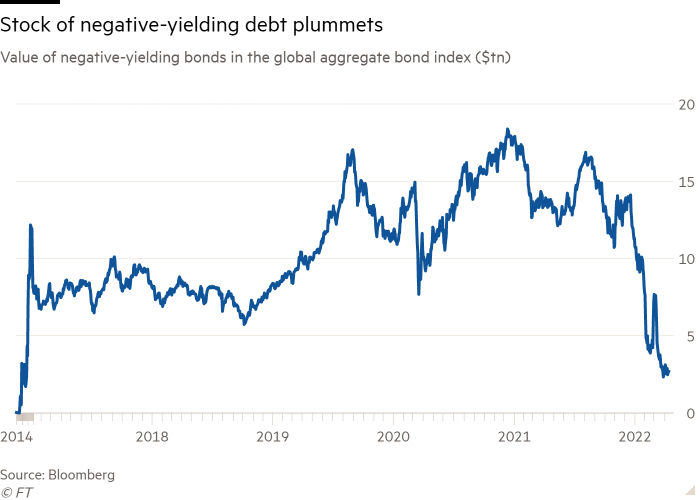This year’s hawkish change in tack from central banks is close to ending the era of negative-yielding debt, shrinking the global tally of bonds with sub-zero yields by $11tn.
Bond prices have tumbled this year as central banks move to end large-scale asset purchases and raise interest rates in their battle with soaring inflation, pushing yields in many big economies to their highest levels in years.
As a result, bonds worth $2.7tn currently trade at a yield of less than zero, the lowest figure since 2015, and a sharp plunge from more than $14tn in mid-December, according to the Bloomberg global aggregate bond index — a broad gauge of the fixed income market. Wiping out negative yields entirely would mark a return to normality for a broad range of big investors.
“Central banks are belatedly trying to get ahead of this inflation shock, so the bond market has abruptly priced in a big shift in interest rates,” said Mike Riddell, a senior portfolio manager at Allianz Global Investors.
Negative yields were once considered inconceivable, then as a novelty, and later as an established feature of global markets. They mean that prices for debt are so high, and interest payments so low, investors are certain to lose money if they hold their bonds to maturity. They reflect a belief that central banks would keep interest rates at rock bottom and have become entrenched in large quantities of debt in Japan and the eurozone in recent years.
That assessment has shifted dramatically in recent months, particularly in the euro area, where the European Central Bank on Thursday reiterated plans to end its bond-buying programme this year, and traders are betting that interest rates will return to zero for the first time since 2014 by December.

An end to ultra-low or negative yields is a “double-edged sword” for bond investors, according to Riddell. “On the one hand people are nursing losses on the bonds they hold. But the flipside is that positive risk-free rates mean future returns arguably look better.” He added that would be “good news” for investors such as pension funds that need to hold large quantities of safe assets like government bonds but also need to earn sufficient returns to meet future payouts.
The dwindling stock of negative-yielding debt also reflects high levels of inflation, which has driven investors to demand greater compensation for rising prices, according to Salman Ahmed, global head of macro at Fidelity International.
“Yes, nominal yields are moving up but long-term investors should really care about real returns. It’s what’s left after inflation that counts, and inflation is very high right now,” he said.
The eurozone has been the big driver of the reduction in debt trading at sub-zero yields. In December, the currency bloc accounted for more than $7tn of such bonds, including all of Germany’s government bonds. That figure has declined to just $400bn. Japan, where the central bank has so far resisted the global shift towards tighter monetary policy, now accounts for more than 80 per cent of the world’s negative-yielding bonds.
Negative yields are likely to multiply again in the euro area, unless the ECB delivers the interest rate rises already priced in by markets. The central bank will struggle to lift rates much from the current level of minus 0.5 per cent given the threat to the region’s recovery posed by Russia’s invasion of Ukraine and the resulting rise in energy prices, Ahmed said.
“I think the ECB has missed the window to normalise policy because the growth shock from Ukraine will be much more severe in Europe,” he added. “In our view they aren’t getting back to zero this year, and that means negative-yielding bonds are not about to disappear.”


